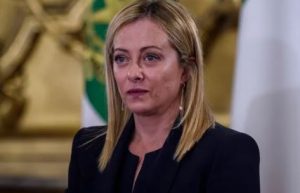Italy’s backflip on migration
In the past few months Italy has undergone a quiet transformation in its approach to migration.
Before becoming Italy’s Prime Minister, Giorgia Meloni was one of the most strident voices on migration in the European Union.
In opposition politician, she warned of Italians being “substituted” by migrant and one of her major election policies was the promise of a naval blockade to stop irregular migration across the Mediterranean.
But since coming to office, she has taken made a volte-face, as they say in Italy, presiding over a sharp spike in irregular arrivals and introducing legislation that could see as many as 1.5 million new migrants arrive through legal channels.
 At a time when the right and far right are in the ascendant ahead of the European Parliament election next spring, Ms Meloni’s policies are potentially a course correction for the continent’s conservative bloc, as hard-line rhetoric is subsumed by the practicalities of governing.
At a time when the right and far right are in the ascendant ahead of the European Parliament election next spring, Ms Meloni’s policies are potentially a course correction for the continent’s conservative bloc, as hard-line rhetoric is subsumed by the practicalities of governing.
Italy is currently economically stagnant and in demographic decline. Over the last decade its population has dwindled by about 1.5 million people, more than the population of Milan.
In 40 of its 107 provinces, there are more retired people than workers.
Economy Minister Giancarlo Giorgetti has warned that no reform of the pension system was not sustainable “in the medium-to-long term with the birth rate numbers we have today in this country”.
Meanwhile Ms Meloni’s legal migration decree estimates that Italy needs 833,000 new migrants over the next three years to fill in the gap in its labour force.
It also opens the door to 452,000 over the same period to fill seasonal jobs in sectors like agriculture and tourism as well as long-term positions like plumbers, electricians, care workers and mechanics.
Observers have called this “super pragmatic behaviour” and “a change in narrative”.
Given Italy’s rules on family reunification, which allow residents to bring in relatives, some estimates predict that over ten years, these figures will triple, bringing in about 1.5 million migrants.
Ms Meloni government has been pushed to implement a more realistic policy by the entrepreneurial class that makes up an important part of its support, other commentators say.
While Ms Meloni’s has maintained a hard line stance on irregular arrivals, it’s been less that effective, with the number of people arriving by boat after crossing the Mediterranean more than doubling this year, to 106,000 so far, compared to 53,000 over the same period last year.
Her policies came under fire in February when about a hundred migrants drowned after the coastguard failed to assist a boat that capsized off the Calabrian coast near the town of Cutro.
Since then, her government has turned its attention to rescue boats run by NGOs, accusing them of incentivising migrants to risk the crossing.
Recently, Italy temporarily seized three ships that had brought in migrants saved at sea.
Across the Mediterranean, Meloni joined European Commission President Ursula von der Leyen to agree a controversial deal with Tunisia, exchanging aid funding for stricter efforts to prevent migrants from making the crossing.
But since then, migrant arrivals have increased by about 40 per cent.
Meloni’s about-face has attracted criticism from y her allies on the right, especially in the far-right League Party that’s part of her coalition.
The League Party has pointed out the absence of the promised naval blockade.
Attilio Lucia, a member of the League and the deputy mayor of Lampedusa, the tiny island where most migrants arrive recently said: “I hoped….now that we finally have a right-wing government the situation would change … but the right is getting worse than the left”.












